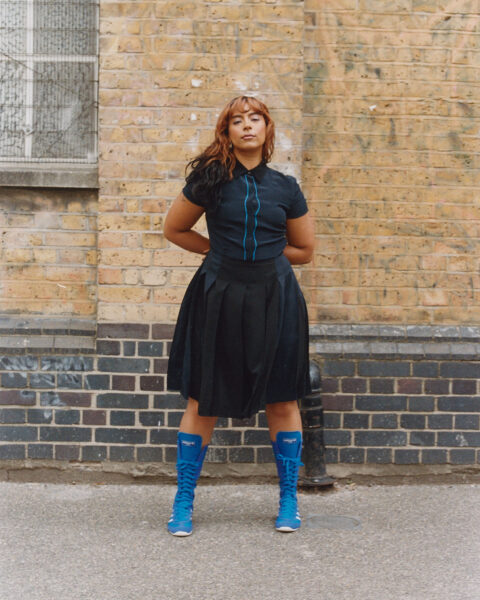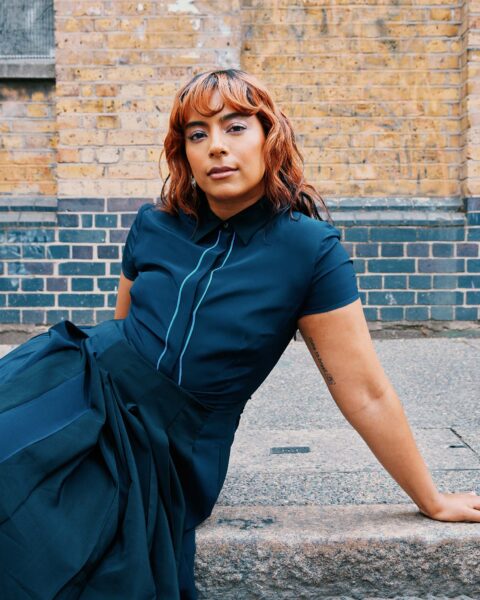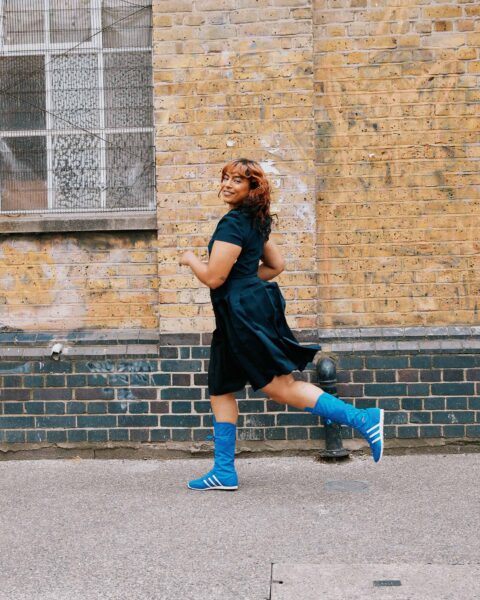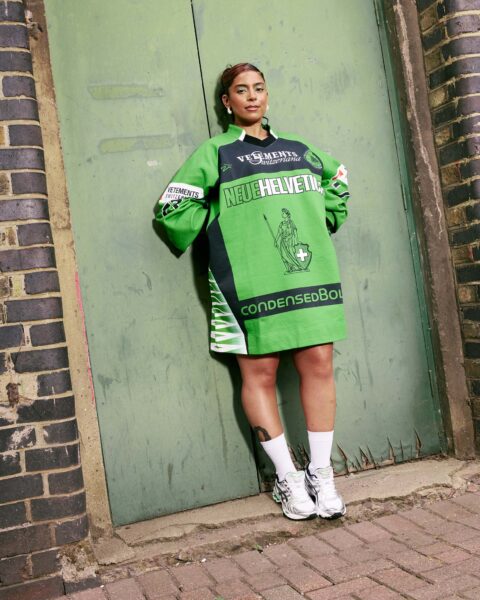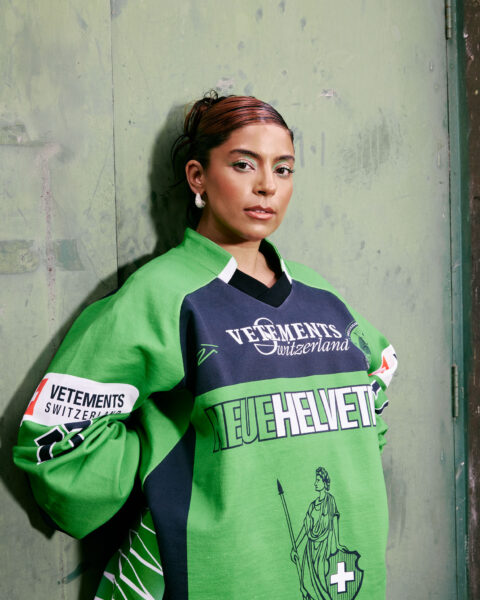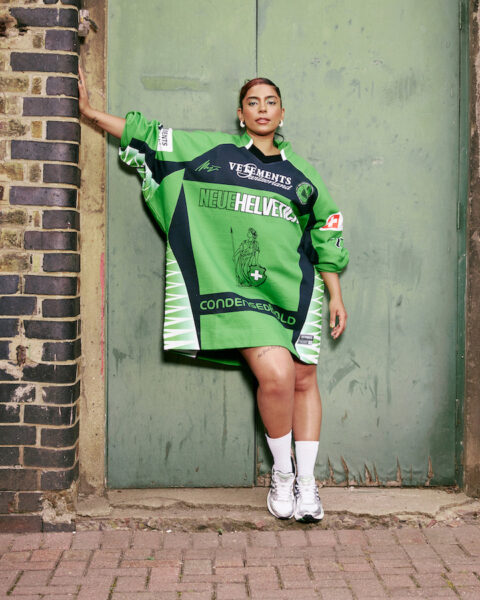In partnership with

- Words Darcy Culverhouse
- Photographer Alex Rorison
- Stylist Sachin Gogna
- Fashion eBay_Collectors
- Makeup Artist India Rawlings
- Hair Stylist Lauren Bell
- Movement Director JJ Saword
- Photography Assistant Michael Fraser Rankin
- Videographer Eben Goode
- Creative Production Studio Notion & Olivia Wright
- Production Assistant Carla Thompson
Whether she’s behind the decks or putting together an outfit, Jyoty is all about keeping you guessing. Never playing by the rules, we chat about producing her own music, opening doors for the next generation and finding her own sense of style.
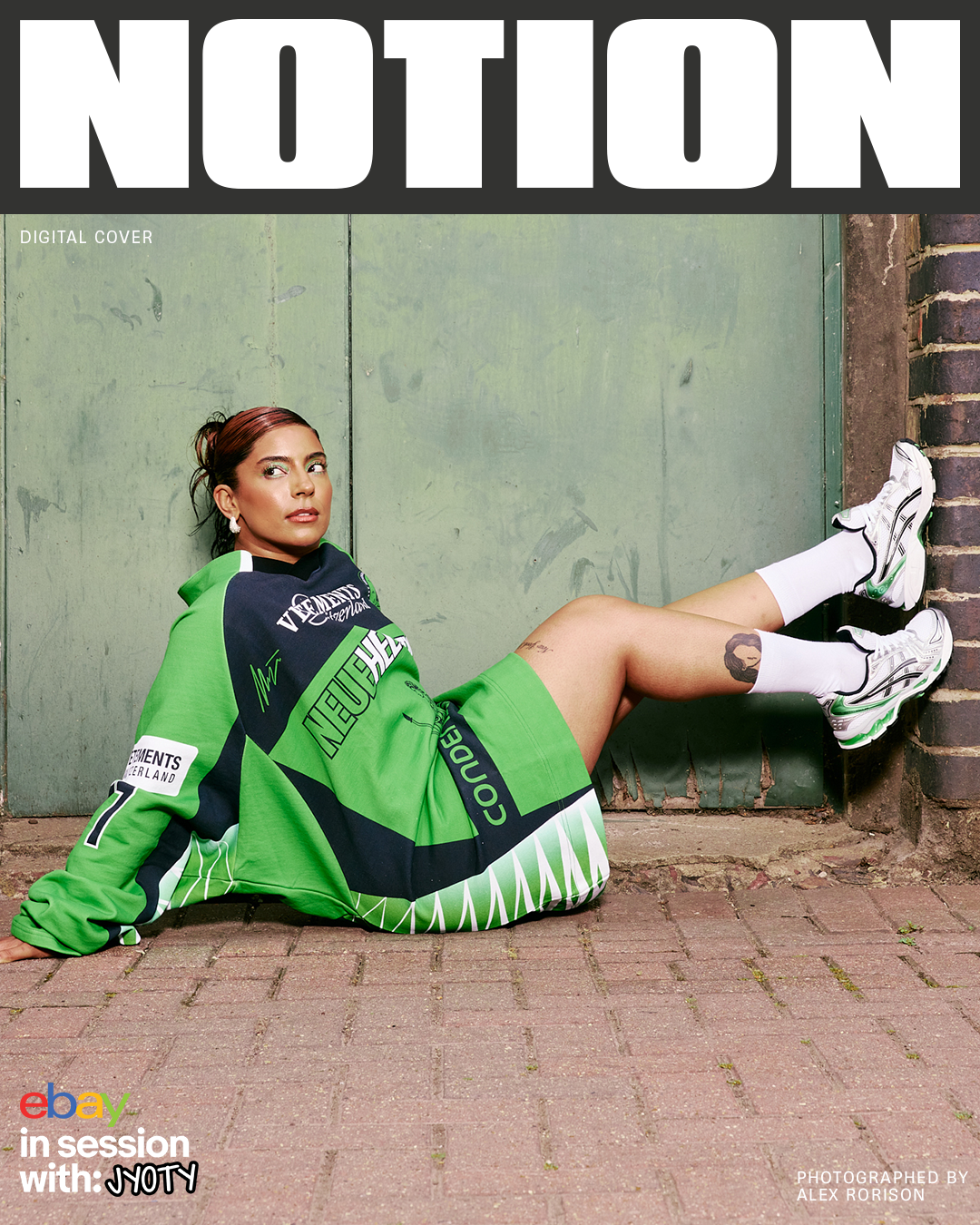
By now, if you’ve spent more than ten minutes inside the electronic scene, you’ve heard the name Jyoty. Maybe it was from a Boiler Room clip that popped off on TikTok just before lockdown. Maybe it was whispered in a sweaty NYC basement club at 3am. Maybe it was screamed across a Glastonbury field. Maybe you just clocked her behind the decks in a fit that no one else could pull off. Either way, the message is the same: Jyoty is the real deal.
Now, as part of eBay’s In Session With series in collaboration with us at NOTION, we’re celebrating the space where music and style collide, and the creative power that lives there. From a competition for emerging DJs to festival style guides, at the heart of our partnership is Jyoty: a tastemaker who’s never followed the crowd, and someone who sees self-expression as a daily practice, whether through sound or second-hand style. For our latest digital cover, she speaks on the importance of staying authentic, how pre-loved fashion helps her reflect who she is in the moment and why making space for the next generation matters now more than ever.
Jyoty herself is approaching a decade behind the decks: a milestone she half-jokingly considers the minimum requirement before she can actually call herself a DJ. But don’t let the modesty fool you. Over the last few years, she’s been everywhere, from setting stages alight with genre-hopping sets to launching Homegrown – her own club night where she books the acts, promotes the party, and shuts it down on the decks.
And yet, when we connect on a late afternoon video call, what hits hardest isn’t her resume, it’s her humility. She leans into the screen with the kind of warmth that cuts through WiFi lag. “I think it’s an older generation thing,” she says, musing on the art of DJ etiquette. “My whole heritage is radio. I’m part of a generation that, as a party-goer, you adapt. If the DJ after you plays slower, you meet them at the end of your set.”
But if you’re trying to predict where Jyoty’s set will end, good luck. Her sonic journeys are anything but linear. One moment it’s an Afrobeat-laced dancehall groove, the next it’s 140 BPM mayhem; R&B slides in; grime crashes through. Then, out of nowhere, a Punjabi radio belter flips the switch.
For Jyoty that eclecticism isn’t strategic, it’s instinctual. “I don’t play sounds leading with intentions,” she says. “It’s organic.” Born and raised in west Amsterdam to Punjabi Indian parents, Jyoty’s musical universe was never small. She grew up hustling, waiting tables at her dad’s restaurant at 11, blowing up her mum’s phone bill with MTV request lines before school, sneaking into clubs as a teenager with military precision, and working at a sneaker store, where a parallel love for streetwear was born.
Later came London: university – a master’s degree in political science and philosophy – then office jobs and executive assistant roles. But everything changed when she found herself at Rinse FM. She pitched her own show, landed a Thursday afternoon slot, and started building a cult following that would soon spill offline. In 2019, the internet caught fire over a chaotic, electric Boiler Room carnival special set and Jyoty became a household name, for a set she’s still unsure about. “I can’t even listen back to it,” she laughs, half-embarrassed. “Technically, I didn’t know how to DJ at that time. It sounded so bad. No one expected it to blow up like it did and suddenly I was having to explain to the world, ‘Hey, that’s not even my real sound.’”
What remains consistent – regardless of the city or the crowd – is that Jyoty plays music with roots. Her sets aren’t meticulously scripted; instead, she selects tracks based on instinct, mood, and cultural resonance. There’s a reverence in the way she DJs, a deep respect for the sounds and scenes that raised her, always paying homage to the source. That same energy fuels her mission to lift others up. She’s constantly plugging rising talent on her socials, booking them at Homegrown, and now teaming up with us, eBay and All Points East to hand the aux to the next wave. One lucky DJ will share a bill with Chase & Status, Nia Archives and Jyoty herself alongside many more notable names, a chance that could change everything.
However, if you thought Jyoty was settling into her spot at the top, think again. As she gears up to turn 35 this month, she’s charging headfirst into a new frontier: production. After sitting in sessions as an executive producer, she had a revelation: ‘Why direct from the sidelines when I could produce myself?’ So she called up her best friend back in Amsterdam and began learning from scratch, a process she describes as transformative: “It’s made me appreciate music in a totally different way. I’m doing it for the love of it, rather than anything else,” she says.
The result is two self-produced EPs set to release later this summer. One’s a sweaty late-night ode to club culture, the other a more intimate exploration of her love for R&B. She’s candid about the uncertainty that comes with releasing something so personal, but she also recognises the creative growth it brings. “I’m not sure how I feel about it yet, but all my friends who have been making music longer than me say that you don’t really improve until you’ve actually released your work. That’s when you learn the most.”
Taking each day as it comes, Jyoty is far from resting on her laurels. With her two EP’s about to drop and a double set at All Points East on the horizon, we catch up with the ever-evolving DJ to discuss authenticity, her passion for second-hand fashion, and what it truly takes to carve out space for the next generation in an industry that rarely makes room.
There are so many layers to our parternship with you and eBay, kicking off with the DJ competition with All Points East. What excites you most about the collaboration?
Everything about this collaboration has a story. The pre-loved clothing carries its own history, the DJ competition adds another layer, and then there’s my personal connection to All Points East. As every element had a story, I felt like I could bring my own story to the shoot: I could be who I am as a person. I didn’t have to look or act a certain way. I could just look like me, feel fierce and let my personality come through. That made the whole shoot feel effortless and made me feel so comfortable within myself.
You’ve had a long-standing relationship with eBay. Do you remember when you first started using it?
I’ve been using eBay for all my pre-loved items since I was a teenager. I actually got locked out of my account when I was 15 because my ex-boyfriend was using my account but wasn’t paying for the items. So my relationship with eBay stretches back 20 years!
You’ve picked up gems and influences from cities across the world, but what’s your personal connection to secondhand fashion? How have past jobs, travels, or even growing up shaped your love for pre-loved style?
If you ask any stylists I work with, they would all tell you about my love for particular vintage designer items. I collect a lot of Prada, Tom Ford, Gucci, as well as items from Moschino, [Roberto] Cavalli and Versace all usually from the nineties to early noughties. If you go into my wardrobe, you’ll see that I own more pre-loved items than anything else. Over the years, I’ve been building up my collection of vintage items from around the world. Now, I’d much rather go shopping in a vintage store than a high-street store.
From working in a sneaker store to building your wardrobe, how has your understanding of authenticity in clothing evolved over the years?
When I started working in a sneaker store, I was already a sneakerhead, so I knew my stuff. Authenticity was key. I was quick to see through bad stitching and design faults in sneakers. When I got into pre-loved items, I started watching YouTube tutorials about how to spot a real from a fake. Now with eBay and other companies using an authentication process, it’s something I really rely on. If you pay for something authentic, you want to get your money’s worth. For me, whenever I buy pre-loved items, I think of it as buying into a specific moment in time that correlates to other moments in music and pop culture. If it’s not the real deal, then I don’t feel like the story is told well.
Of course, authenticity has always been at the core of your artistry. Why is authenticity so central to your journey, and why does it matter now more than ever?
Everyone I look up to who may be described as being “authentic” is just doing what feels natural to them. They’re doing their own thing, changing as the tides change with them and not being swayed in every direction. I think people find me authentic because I never know what I’m doing and I let people know that. I’m figuring out things as I go. I never have the answers and I never pretend to have them. I’m constantly looking back at myself thinking ‘What the fuck was I doing?’ and I share that with people. In my music sometimes there is no deeper story and that is what’s authentic. I’m not romanticising what I do and I’m vocal about that. I have a lot of peers in the industry who are very reserved and let their work speak for themselves as the proof is in the pudding. I find that really authentic.
Your sound is incredibly expansive. You play everything from Afrobeats and dancehall to baile funk to grime and garage. How does your approach to fashion reflect that same experimental energy? And how do you use style to express who you are?
I don’t think I experiment with my sound at all. I always disappoint people when I say this, as I use sounds from all around the world. But these are sounds I grew up with. I’m only realising as I grow older that a lot of people didn’t grow up around these genres, but being brought up in the west side of Amsterdam meant I had access to everything. I don’t play sounds leading with intentions: it’s organic first, and then my intention comes after. I will always pick and play someone from the source and the original community rather than someone who can emulate it, like myself.
It’s the same thing with fashion, I don’t think about it. I don’t have a particular style that I can fully commit to, which correlates to my music, as I cannot commit to one sound or genre. Regarding what I wear, sometimes there is no deeper meaning; I’ve always just dressed that way. I’ve always liked sneakers, but I’ve also been into a lot of girly aesthetics. These are just looks I’ve grown up with on TV as well as on the streets of Amsterdam. I like too many things to commit to just being a Y2K baddie or the Japanese streetwear girl.
Your unpredictable sets are what you’re known for, but there’s always something unmistakably you in the mix. What’s the thread that ties every Jyoty set together, no matter where you’re playing?
Over the last few years, I haven’t prepped a single set. I make a folder based on new tracks that have come out in the city that I’m performing in, but that’s it. I don’t prep material as sonically I’ve changed so much over the years. Take my first Boiler Room set in 2019, I was only two years into DJing. Technically, I didn’t know how to DJ at that time. It sounded so bad. No one expected it to blow up like it did and suddenly I was having to explain to the world, ‘Hey, that’s not even my real sound.’
I’ve built an audience that knows my sets are always full of surprises. You never quite know what to expect, and if you want to keep up, you’ll have to follow along to hear the sounds I’m currently into. That said, I always tailor my sets to fit the time and place I’m performing. If I’m on at 3pm at a festival, I’m going to look at the DJs directly before and after me and fit perfectly in the middle. But if you see me in the same city at 10pm that day, I’m going to sound completely different.
Not many DJs would take the time to blend in so thoughtfully, what makes that important to you?
I think it’s a lot of an older thing. My whole heritage is radio. I’m part of a generation that, as a party-goer, you adapt. If the DJ after you plays slower, you meet them at the end of your set. There is always a little courtesy. I only do that because it happened to me when I was younger. But often I go on after a newer DJ who plays super hard. I don’t care if they play super hard. You do you, I’ll just reset the room. It’s not a make or break for me, but it makes me feel more comfortable when I keep it in mind for the next act.
You’re now working on two self-produced EPs, marking a major new chapter. What are you trying to express through production that DJing alone couldn’t capture? And what’s been the biggest challenge?
I’ve been a DJ for 8 years and I’m only now getting confident about my DJ skills. People always say that you need 10 years in the game before you can call yourself a DJ, and I think that applies to me. Earlier this year, I made a very vocal decision that I didn’t want to grow in size as a DJ, so I’ve recently been very dedicated to doing a lot of intimate and smaller events. I’ll do the odd stage arena but I’ll voice that it doesn’t necessarily make me happy.
I’ve already ticked off some amazing bucket list things as a DJ. I didn’t want to get bored and rest on my laurels. I was being brought in as an executive producer by my friends and as I started to write music, I thought that instead of telling a producer what to do, it would be nice to do it myself. I’ve been learning the ropes of production as it started with me wanting to pick up a new skill and find a new passion in music that would get me excited. You start appreciating music in a totally different way when you learn production. It’s been a fun journey as I’m doing it for the love of it, rather than anything else. I want people to know that I haven’t been just looking at my success and just riding the wave, I’m doing more. Now I’m at a place where I’m about to put music out into the world. I’m not sure how I feel about it yet, but all my friends who have been making music longer than me say that you don’t really improve until you’ve actually released your work. That’s when you learn the most.
You’ve always championed emerging talent, whether on your radio show, at gigs or online. Why do you feel so strongly about supporting the next generation of creatives?
Festival line-ups have become predictable and boring. This is because the behavioural habits of live events have changed from a consumer perspective. We are in a time where there is very little money, the market is saturated and people have short attention spans. A lot of promoters and bookers are just trying to keep their heads above water, so they’re just meeting demand. But what that means is that we’re seeing the same people over and over again.
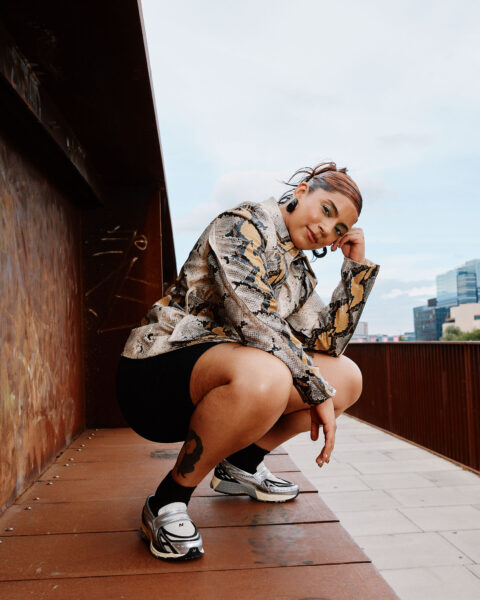
- Jacket & Shorts Jyoty's own
- Sneakers New Balance
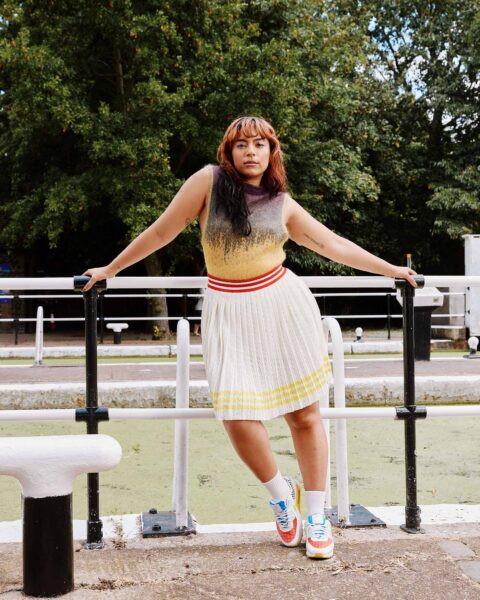
- Top Roberto Cavalli
- Skirt Gucci x Adidas
- Sneakers Nike
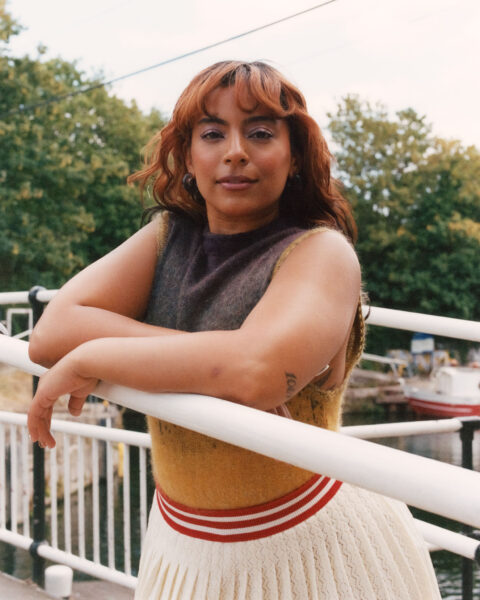
That’s also why you’re the perfect judge for the eBay x NOTION Emerging DJ competition at All Points East. What are you looking for in the entries? And what excites you most about this project?
I’m looking for someone who we haven’t heard before and is a breath of fresh air on the line-up. I want someone who has been perfecting their craft as much as they can, whether that’s in their bedrooms or in small local pubs or clubs. A festival stage is a very different ball game sonically and people-wise. Emerging DJs are only going to get better once they’ve done it, it’s literally learning on the job. If no one hires you to do the job, then you’re not going to get better at it.
You’re playing two huge days at All Points East this year. How are you feeling ahead of these sets, and how do you prepare for festival crowds compared to club nights?
On Chase & Status’ day, I’m B2B with Ahadadream so I’m not stressing about that as he plays a very niche tempo, usually between 125-135 BPM. It makes my life much easier as I know what his signature sound is, so I can match that.
For RAYE, I’m recreating what I did last year for KAYTRANADA, where I did a specialist R&B set. It’s going to be very old-school, very nostalgic but also sexy and girly. It’s going to be a summertime flirty sound. The days are a week apart, which is perfect as it’s like my split personalities going B2B.
All Points East is such a landmark moment, especially with the DJ competition happening on the same day. What does it mean to be part of the lineup and platform the next generation on that stage?
I’ve been wanting to work on collaborations where brands or companies give something back to my audience for a while now. So when I was approached with the idea of a competition and found out I’d get to personally choose the winner I was genuinely excited. Selfishly, I also hope to discover some new talent I can keep in my little black book. I plan to really listen to the mixes and make note of their social handles and profiles. For me, this competition is about doing something with purpose and creating opportunities for others at the same time.
You’ve come such a long way, and it sounds like you’re still just getting started in some ways. What’s keeping you inspired right now, and where do you hope the road takes you next?
I have no clue what next year looks like or the short-term future. But what I do know is that I still love being a DJ. Personally I have to hit the 10-year mark before I decide it’s not for me. I can’t tell you what kind of DJ I am as I’m still figuring that out stylistically. I see myself furthering my work as a producer over the next few years and hopefully returning to my Rinse FM show. I know that I’m not going to be erased from my DJ roots if I keep on creating, advancing and consuming within the scene. As long as I’m on the dancefloor I’m going to be contributing something of value behind the decks.


